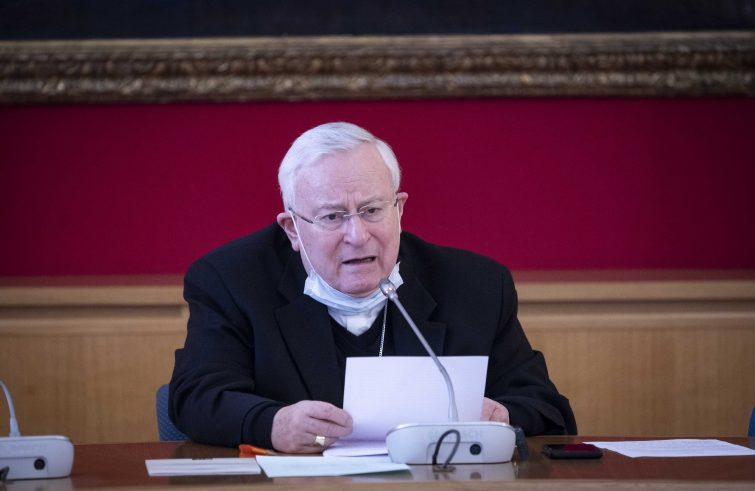
“A response marked by communion and co-responsibility” is needed to heal “the many isolated rifts in society that the pandemic has expanded to include all the threads that hold our territories together”, declared Cardinal Gualtiero Bassetti, archbishop of Perugia-Città della Pieve, President of the Italian Bishops’ Conference, in the inaugural address of the Permanent Episcopal Council, now in progress via videoconference. His Eminence highlighted the role of the clergy at the time of the COVID-19 pandemic in terms of “reconciliation”, notably “fraternal” reconciliation, which requires “collaboration and solidarity”; political reconciliation, to repair “the social fabric lacerated by economic and social distress”; reconciliation with science, to ensure “the responsible incorporation of its achievements as a veritable contribution to everyone’s wellbeing.” The vision was outlined five years ago by Pope Francis in his address to the Italian bishops in Florence, on the occasion of the 5th Convention of the Italian Church. “We must embark on a journey, with our gaze directed beyond the current emergencies. Only in this way can the dream be fulfilled for our communities,” said the president of the Italian Bishops’ Conference, highlighting the topical relevance of the theme of the Pastoral Guidelines of the Italian Church for the 1980s, titled “Communion and Community.”
“The Church does not takes sides,
he said referring the political crisis: “The good of each and every person together with others is our main concern. What we care about is people’s lives, and that which we support is our country.” “We are thus closely following the ongoing political crisis with concern, against the prevailing backdrop of precarious circumstances”, he added referring to the present situation:
“It is our hope that the political leaders will cooperate in the service of the citizens, those men and women who, every day throughout Italy, are working in silent dedication, and that a solution that acknowledges the numerous critical issues will be found. As shepherds, it is our task to give voice to countless fragilities, so that no one is left behind. The coming months will be crucial for the recovery of the country. We wish to offer our constructive contribution to this process.”
The issue of vaccines is under the spotlight in the context of the current health emergency. As the Holy Father pointed out a few days ago, vaccines can go from being “an act of individual protection” to becoming “an instrument for collective protection” and “must be available to all”. “Many differing – occasionally conflicting – views have been expressed on the issue of COVID-19 vaccines. Amidst the deafening noise magnified by media outlets, people risk becoming disoriented”, the Cardinal pointed out, urging the faithful to keep themselves properly informed so as to “be able to distinguish between sound scientific research and opinions based on posts shared on social networks.”
“Besides trusting the effectiveness of vaccines, the dramatic collateral damage caused by this pandemic must not be disregarded”,
remarked His Eminence, for whom “the ongoing health crisis is also a social crisis, resulting in loneliness, social isolation, increased cases of mental illness, and rising suicide rates. “Young people, the elderly, people with disabilities and vulnerable groups are the first to suffer from these ills of the soul”, he denounced, adding that the only viable vaccine is “a vaccine for the heart”, consisting of respect, gratitude, altruism and empathy.
Alongside the health and social divide, in this time of pandemic, “unfortunately, the crisis involving new forms of poverty is increasingly serious, corroborated by dramatic data.”
“If effective measures to tackle the over-indebtedness of households and businesses- for the first time in this condition as a result of the pandemic- are not adopted, the alarming situation leading to resort to usury, and to organised crime penetrating the economic and social fabric, will intensify”,
the Cardinal cautioned. The proportion of the new poor increased from 31% to 45%: nearly one person in two are turning to Caritas for the first time.
“The generous solidarity of many should be backed by the political resolve to move beyond the emergency and temporary relief approach to develop a structural strategy aimed at making the best possible use of the resources available”,
is the appeal of the President of the Italian Bishops’ Conference, according to whom “new sustainable, innovative tools and solutions must be created from the social perspective, along with actions in support of financially vulnerable situations, directed at those experiencing difficulties, reaching out to them, acknowledging their needs and helping them take the right decisions at the first signs of alarm, preventing them from being taken aback by worsening conditions.”
Finally, the health crisis has also brought about an educational crisis. “Children, families and young people should not be considered in an abstract terms” – the proposal: “Let’ s work with them. Let’s encourage them to get involved, to work on ideas and projects for more inclusive schools, for more lively parishes, for renewed catechesis. Let us not limit ourselves to merely drawing the attention of the younger generations to the unquestionable hardships of our time, but rather help them understand more deeply what they are experiencing. We should acknowledge their resilience, convey our belief that this is also a precious time to discover the key elements of human life. This is also a time to grow, to appreciate life, to care for it, to build a future. This is not a time wasted if it is a time for sowing and building.” In conclusion, the President of the Italian Bishops’ Conference extended his gratitude to the “hope-filled presence of the ecclesial community in support of the men and women of our time”, especially parish priests, men and women religious, catechists and educators. Renewed hope for an increasingly synodal Church, for “a diakonia of the human person in his or her fullness and complexities.
“The discernment of the faith is our method; the human person is our concern; the community is our perspective,”
Bassetti concluded: “Let us proceed along this path”.










